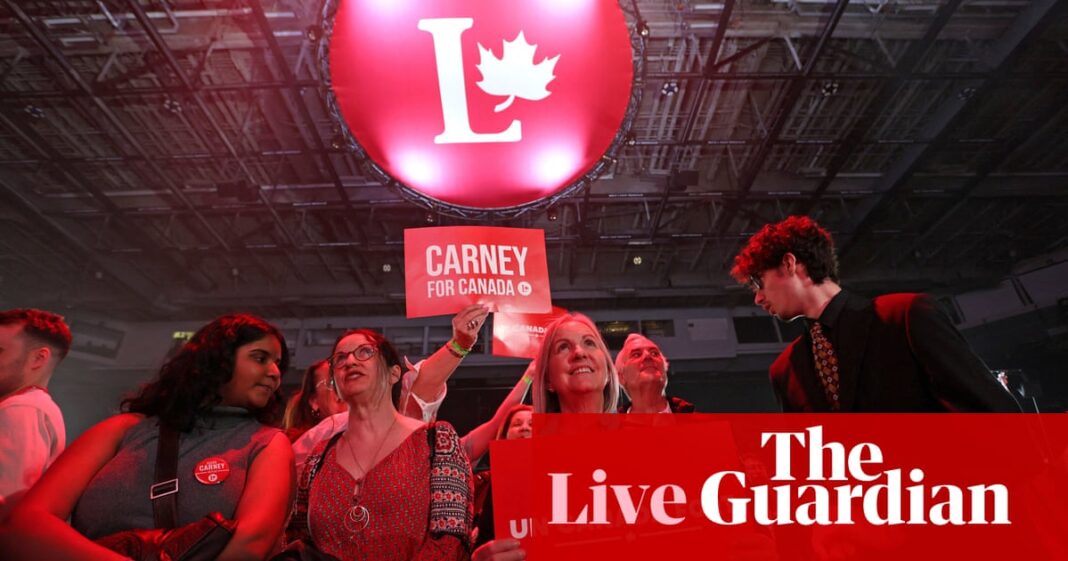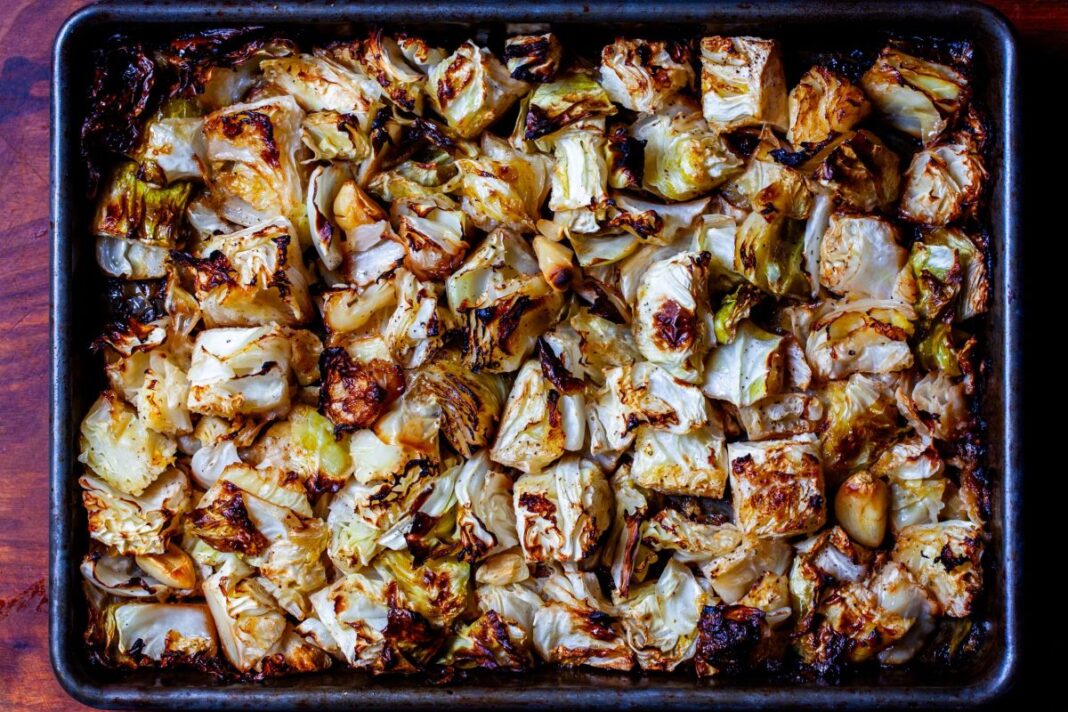Carney’s Liberals projected to win election, but not clear if will gain majority
Leyland Cecco
Mark Carney’s Liberal party is projected to win the 2025 federal election, but results in a number of key electoral districts are too close to determine if the party will have a majority government, or be held to a minority for the third consecutive election.
While the full results aren’t yet in, the Liberals are leading or elected in enough seats to prevent any other party from forming government.
Supporters at the Liberal election night party erupted in cheers when multiple networks called the election for the party. The path to victory for the party, left for dead as recently as February, relied heavily on the collapse of the New Democratic party and the Bloc Québécois.
Key events
Shachi Kurl, president of the Angus Reid Institute, a polling firm, has told Reuters the Liberal win hinged on three factors. He said:
It was the ‘anybody-but-Conservative’ factor, it was the Trump tariff factor, and then it was the [former prime minister Justin] Trudeau departure … which enabled a lot of left-of-center voters and traditional Liberal voters to come back to the party.
David Lametti, a former Liberal justice minister, is giving the credit for the projected Liberal win to Mark Carney. He told CTV:
We were dead and buried in December. Now we are going to form a government.
We have turned this around thanks to Mark.
Mark Carney, who has never been in parliament before, is projected to win a seat in the Ottawa riding of Nepean – that will make him the first prime minister to hold a seat in Ottawa since the 1880s, according to CBC. Preliminary results have him on 63% of the vote.
The Elections Canada website still appears to be experiencing technical difficulties, although results are still going out to news websites via a back-end process.
Who is Mark Carney?
In case you need a refresher on Mark Carney, the former governor of the Bank of England and the Bank of Canada who only recently became prime minister without ever having held a seat in parliament, here’s an extract from our recent profile of him:
Carney’s credentials as a political outsider would in normal times have killed his candidacy in Canada but his distance from unpopular incumbent Justin Trudeau and a high-profile banking career played to his advantage, and Carney argues he is the only person prepared to handle Trump.
“I know how to manage crises … in a situation like this, you need experience in terms of crisis management, you need negotiating skills,” Carney said during a leadership debate last month.
He said in an interview last month: “President Trump probably thinks Canada will cave in. But we are going to stand up to a bully, we’re not going to back down. We’re united and we will retaliate.”
Carney has called the threats posed by Trump “the most serious crisis of our lifetime” and said on Sunday that the US wants “our resources, our water, our land, our country”.
Daniel Béland, the director of the Institute for the Study of Canada at McGill University, described Carney as a “technocrat”. “He’s a boring guy who in general doesn’t have a lot of charisma,” Béland said. However, he noted that Carney’s rigorous competence with no flash may be appealing, given Canada is rattled by Trump’s trade chaos and attacks on its sovereignty.
Read on below:
A few pics from Liberal party headquarters:
Carney’s Liberals projected to win election, but not clear if will gain majority
Leyland Cecco
Mark Carney’s Liberal party is projected to win the 2025 federal election, but results in a number of key electoral districts are too close to determine if the party will have a majority government, or be held to a minority for the third consecutive election.
While the full results aren’t yet in, the Liberals are leading or elected in enough seats to prevent any other party from forming government.
Supporters at the Liberal election night party erupted in cheers when multiple networks called the election for the party. The path to victory for the party, left for dead as recently as February, relied heavily on the collapse of the New Democratic party and the Bloc Québécois.
Some pictures from the headquarters of the Conservative party:
Early results suggest collapse of separatist Bloc Québécois
Leyland Cecco
Early results from Quebec suggest a collapse of the separatist Bloc Québécois has benefited the incumbent Liberals.
Mark Carney’s Liberals are currently over performing their 2021 federal election result, which produced a minority government.
The prospect of a trade war and Donald Trump’s threats to annex Canada have given the Liberals a boost in the francophone province.
Polls have now closed across Canada.
People in several communities in Canada’s Arctic Nunavik region have been unable to vote as Elections Canada struggles to transport its staff due to bad weather, Radio Canada is reporting.
Voters in Salluit, Ivujuvik, Tasiujaq, and Puvirnituq were unable to vote, the broadcaster reports.
“We have neither ballots nor information on how to proceed [to vote] in this election,” it quoted the mayor of Ivujivik, Adamie Kalingosaid, as saying.
Radio Canada said the election agency had confirmed it was attempting to reach several remote communities without specifying which ones.
Prime minister Mark Carney and his wife, Diana Fox Carney, watch the results rolling in:
Dramatic drop in support for New Democratic party as polls close
Leyland Cecco
Polls have closed in much of Canada, with the vote-rich provinces of Ontario and Quebec already beginning to report results.
Already, there is evidence of a dramatic drop in support for the New Democratic party in much of the country, which could boost Liberal hopes of emerging from the night with the most seats.
In Quebec, a strong support from the separatist Bloc Québécois could hold both the Liberals or the Conservatives to a minority government.
Some insight into the results from Tyler Olsen, a journalist in British Columbia, who posted on X:
The NDP vote is what will determine this election. Returns suggest vote total collapsing by as much as 75%. If that holds, the more popular the NDP was any particular area, the better the Liberal will do.
Leyland Cecco
Early results from the Atlantic provinces have both the Liberals and Conservatives outperforming their previous results in the 2021 federal election, with the leftwing New Democratic party collapsing in the region.
Supporters of both the Liberals and Conservatives have nonetheless seized on the results to suggest their respective parties are overperforming expectations, despite significant shifts as more votes are counted.
Throughout the course of the election, the starkly different messages from two main parties – and the spectre of a looming trade showdown with the United States – have transformed the race into a “presidentialized” vote at the expense of opposition parties.





